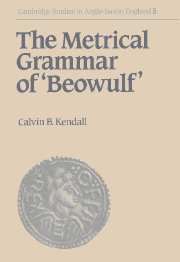Book contents
- Frontmatter
- Contents
- Preface
- List of abbreviations
- List of changes from Klaeber's text
- 1 The Beowulf-poet and his metrical grammar
- 2 The alliterative and metrical principles of Beowulf: Kuhn's ‘laws’ and the transformational rule
- 3 The three kinds of half-lines: extra-metrical alliteration and type A3
- 4 Displacement
- 5 Stressed proclitic adjectives: X-positions and the insertion rule
- 6 Problems with the identification of clause-non-initial half-lines: the proclitic onset
- 7 Half-lines with internal clause divisions: the transformational rule (revised)
- 8 The alliterative requirement of unstressed prefixes and the copulative conjunctions
- 9 The alliterative requirement of prepositions and the proclitic adverbs and instrumentals
- 10 The alliterative requirement of proclitic adjectives and pronouns: the alliterative rule of proclitics
- 11 Displaced and detached proclitics
- 12 The three classes of compounds: the alliterative requirement of class I compounds
- 13 The alliterative behaviour of class II compounds
- 14 The alliterative behaviour of class III compounds and simplexes
- 15 Metrical typology and the metrical grammar
- 16 Conclusions
- Appendix: A typology of the metre of Beowulf in relation to the metrical grammar
- Glossary of technical terms
- Bibliography
- Index of alliteration, scansion and metrical clause structure
- Index of verses specially discussed
8 - The alliterative requirement of unstressed prefixes and the copulative conjunctions
Published online by Cambridge University Press: 22 September 2009
- Frontmatter
- Contents
- Preface
- List of abbreviations
- List of changes from Klaeber's text
- 1 The Beowulf-poet and his metrical grammar
- 2 The alliterative and metrical principles of Beowulf: Kuhn's ‘laws’ and the transformational rule
- 3 The three kinds of half-lines: extra-metrical alliteration and type A3
- 4 Displacement
- 5 Stressed proclitic adjectives: X-positions and the insertion rule
- 6 Problems with the identification of clause-non-initial half-lines: the proclitic onset
- 7 Half-lines with internal clause divisions: the transformational rule (revised)
- 8 The alliterative requirement of unstressed prefixes and the copulative conjunctions
- 9 The alliterative requirement of prepositions and the proclitic adverbs and instrumentals
- 10 The alliterative requirement of proclitic adjectives and pronouns: the alliterative rule of proclitics
- 11 Displaced and detached proclitics
- 12 The three classes of compounds: the alliterative requirement of class I compounds
- 13 The alliterative behaviour of class II compounds
- 14 The alliterative behaviour of class III compounds and simplexes
- 15 Metrical typology and the metrical grammar
- 16 Conclusions
- Appendix: A typology of the metre of Beowulf in relation to the metrical grammar
- Glossary of technical terms
- Bibliography
- Index of alliteration, scansion and metrical clause structure
- Index of verses specially discussed
Summary
Proclitics serve two special and possibly unexpected functions in the metrical grammar of Beowulf. They help determine the position of the half-line in the verse clause, and they impose an alliterative requirement on the forms to which they are attached. The purpose of this and the following two chapters is to describe in analytic terms the way proclitics affect the alliterative patterns of the poem.
Proclitics include all those words and prefixes which in ordinary circumstances are not independently stressed within the structure of the clause. Instead they attach themselves to other single words or phrases which do carry independent stress. There are five types of proclitics in the metrical grammar – (1) unstressed prefixes; (2) copulative conjunctions; (3) prepositions; (4) proclitic adverbs and instrumentals; and (5) proclitic adjectives and pronouns. The alliterative requirement of the prefixes and conjunctions will be considered first.
THE UNSTRESSED PREFIXES
The unstressed prefixes which occur in Beowulf are a-, æt-, be (bi)-, for-, ful(l)-, ge-, geond (giond)-, of-, ofer-, on (an)-, oð-, to-, purh-, wið- and ymb(e)-. Ten of them are never stressed in the poem. Of these ten, a-, geond-, of-, oð-, purh- and wið- are joined only to verbs, for- and to- appear also before adverbs, conjunctions and prepositions and be- and ge- are found even with nouns and adjectives.
- Type
- Chapter
- Information
- The Metrical Grammar of Beowulf , pp. 100 - 115Publisher: Cambridge University PressPrint publication year: 1991



